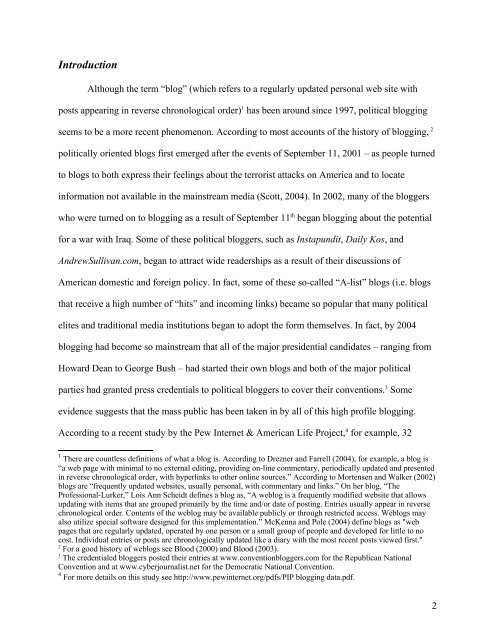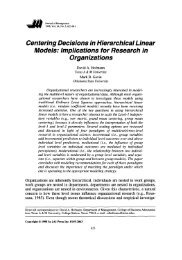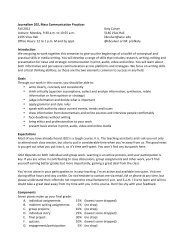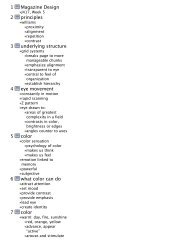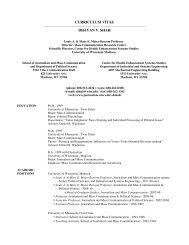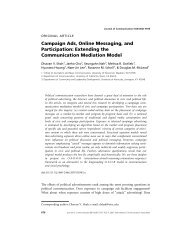Political Blogs and the Bloggers Who Blog Them - School of ...
Political Blogs and the Bloggers Who Blog Them - School of ...
Political Blogs and the Bloggers Who Blog Them - School of ...
You also want an ePaper? Increase the reach of your titles
YUMPU automatically turns print PDFs into web optimized ePapers that Google loves.
Introduction<br />
Although <strong>the</strong> term “blog” (which refers to a regularly updated personal web site with<br />
posts appearing in reverse chronological order) 1 has been around since 1997, political blogging<br />
seems to be a more recent phenomenon. According to most accounts <strong>of</strong> <strong>the</strong> history <strong>of</strong> blogging, 2<br />
politically oriented blogs first emerged after <strong>the</strong> events <strong>of</strong> September 11, 2001 – as people turned<br />
to blogs to both express <strong>the</strong>ir feelings about <strong>the</strong> terrorist attacks on America <strong>and</strong> to locate<br />
information not available in <strong>the</strong> mainstream media (Scott, 2004). In 2002, many <strong>of</strong> <strong>the</strong> bloggers<br />
who were turned on to blogging as a result <strong>of</strong> September 11 th began blogging about <strong>the</strong> potential<br />
for a war with Iraq. Some <strong>of</strong> <strong>the</strong>se political bloggers, such as Instapundit, Daily Kos, <strong>and</strong><br />
AndrewSullivan.com, began to attract wide readerships as a result <strong>of</strong> <strong>the</strong>ir discussions <strong>of</strong><br />
American domestic <strong>and</strong> foreign policy. In fact, some <strong>of</strong> <strong>the</strong>se so-called “A-list” blogs (i.e. blogs<br />
that receive a high number <strong>of</strong> “hits” <strong>and</strong> incoming links) became so popular that many political<br />
elites <strong>and</strong> traditional media institutions began to adopt <strong>the</strong> form <strong>the</strong>mselves. In fact, by 2004<br />
blogging had become so mainstream that all <strong>of</strong> <strong>the</strong> major presidential c<strong>and</strong>idates – ranging from<br />
Howard Dean to George Bush – had started <strong>the</strong>ir own blogs <strong>and</strong> both <strong>of</strong> <strong>the</strong> major political<br />
parties had granted press credentials to political bloggers to cover <strong>the</strong>ir conventions. 3 Some<br />
evidence suggests that <strong>the</strong> mass public has been taken in by all <strong>of</strong> this high pr<strong>of</strong>ile blogging.<br />
According to a recent study by <strong>the</strong> Pew Internet & American Life Project, 4 for example, 32<br />
1 There are countless definitions <strong>of</strong> what a blog is. According to Drezner <strong>and</strong> Farrell (2004), for example, a blog is<br />
“a web page with minimal to no external editing, providing on-line commentary, periodically updated <strong>and</strong> presented<br />
in reverse chronological order, with hyperlinks to o<strong>the</strong>r online sources.” According to Mortensen <strong>and</strong> Walker (2002)<br />
blogs are “frequently updated websites, usually personal, with commentary <strong>and</strong> links.” On her blog, “The<br />
Pr<strong>of</strong>essional-Lurker,” Lois Ann Scheidt defines a blog as, “A weblog is a frequently modified website that allows<br />
updating with items that are grouped primarily by <strong>the</strong> time <strong>and</strong>/or date <strong>of</strong> posting. Entries usually appear in reverse<br />
chronological order. Contents <strong>of</strong> <strong>the</strong> weblog may be available publicly or through restricted access. Weblogs may<br />
also utilize special s<strong>of</strong>tware designed for this implementation.” McKenna <strong>and</strong> Pole (2004) define blogs as "web<br />
pages that are regularly updated, operated by one person or a small group <strong>of</strong> people <strong>and</strong> developed for little to no<br />
cost. Individual entries or posts are chronologically updated like a diary with <strong>the</strong> most recent posts viewed first."<br />
2<br />
For a good history <strong>of</strong> weblogs see Blood (2000) <strong>and</strong> Blood (2003).<br />
3<br />
The credentialed bloggers posted <strong>the</strong>ir entries at www.conventionbloggers.com for <strong>the</strong> Republican National<br />
Convention <strong>and</strong> at www.cyberjournalist.net for <strong>the</strong> Democratic National Convention.<br />
4 For more details on this study see http://www.pewinternet.org/pdfs/PIP blogging data.pdf.<br />
2


